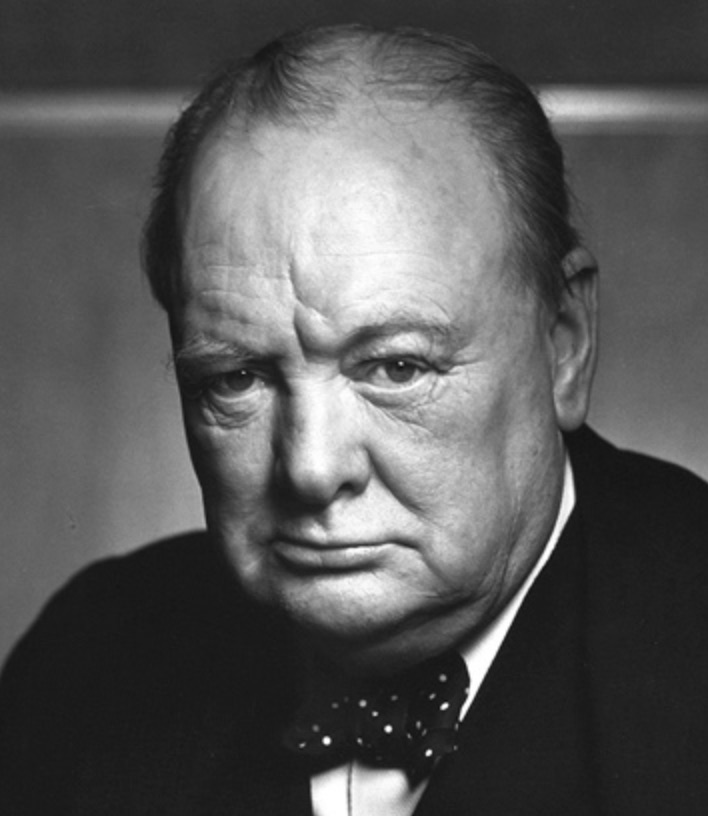
Sir Winston Leonard Spencer Churchill was born on November 30, 1874 in Oxfordshire, UK. His father, Lord Randolph Churchill, was a Member of the British Parliament and his mother, Jennie, was a daughter of a wealthy American businessman Leonard Jerome. Throughout most of their childhood, Winston and his younger brother, Jack were raised by their nanny, Elizabeth Everest.
At seven years of age, Winston was shipped off to St. George’s boarding school in Ascot, Berkshire. He was described as an unruly student and his academic performance was poor. In 1888 at age 13, Winston just barely passed the entrance exam to Harrow School where he continued to struggle academically. Following his father’s wish that he enter the military, Winston eventually gained entry to the Royal Military Academy, Sandhurst from which he graduated in 1895.
Eager to enter the theater of battle, Winston spent his early 20’s engaging in wars in Cuba, India and the Sudan in Africa. During his time in India, Churchill began an intense program in self-education, studying the works of Plato, Edward Gibbon, Charles Darwin and Thomas Macaulay sent to him by his mother. In 1898, Winston returned to England and began writing his famous book The River War that was published the following year. This book, Churchill’s third, documented Lord Kitchener’s conquest of the Sudan between 1896 and 1899 in which the Anglo-Egyptian forces prevailed over the Sudanese Dervish forces. Through his program of self-education and his first-hand experience of battle, Churchill had transformed himself into an engaging author–something that enabled him to escape his periodic bouts of depression.
By October 1899, Churchill was in South Africa serving as a journalist for the Morning Post newspaper to report on the Second Boer War. When his train was derailed, he was captured and interned in a prisoner of war camp in Pretoria. In December, he escaped to Portuguese East Africa and by January 1900 had rejoined the army as a lieutenant in the South African Light Horse regiment. Churchill was among the first troops to enter and recapture Pretoria.
By February 1901, Churchill had launched what would become a life in politics, taking his first seat in the House of Commons. In the years that followed, his political views became increasingly more liberal as he supported open trade, labor unions, and open immigration policies. In October 1911, Prime Minister Asquith appointed him as the First Lord of the Admiralty. In that role, Churchill built the British navy, vowing to produce two battleships for every battleship produced in the increasingly militaristic Germany.
When war broke out in 1914, the Germans scored several early victories. Churchill advised the War Council to help the Russians in their fight on the Turkish front by sending the navy through the Strait of Gallipoli. Though both sides in this infamous battle suffered heavy losses, the British forces and their allies were forced to withdraw and Churchill was blamed for the defeat, in spite of a later exoneration by the Dardanelles Commission.
After the war, Prime Minister Lloyd George appointed Churchill as Secretary of State for War and for Air. In those roles, he performed a variety of functions, reducing the size of the military, dealing with the Irish war of independence, and resolving various skirmishes in different regions across the globe. By 1922, Lloyd George’s government had collapsed and Churchill was voted out of office for two years. It was during this time that he began painting and immersed himself in writing a multitude of books including his memoirs. In spite of all these accomplishments, by the end of 1939, Churchill had not yet reached his “finest hour.”
At the outbreak of the Second World War on September 3, 1939, Prime Minister Neville Chamberlain appointed Churchill as the First Lord of the Admiralty. Then, in May 1940, when Chamberlain lost a vote of non-confidence, Winston Churchill became Prime Minister and leader of the Allied war effort. The rest of the story, is familiar history to many who have read or listened to Sir Winston Churchill’s remarkable speeches and skilled oratory that inspired the British people and played a key role in the ultimate victory over the Axis powers.
In the year 2000, Albert Einstein, widely celebrated as the quintessential genius, was selected by Time Magazine, not as the person of the year, but as the person of the century! Sir Winston was among others being considered for having “the greatest impact on this century, for better or worse.” Choosing a “greatest impact” created a lot of controversy, because comparing the influence of people in different domains requires a judgment about the relative importance of each domain. Journalist Charles Krauthammer suggested that Winston Churchill, rather than Einstein, deserved the accolade, asserting, “If Einstein hadn’t lived, the ideas he produced might have been delayed. But take away Churchill’s stand in 1940, and fascism might well have triumphed.” Some snippets of insight into the origin of Churchill’s oratory gifts and samples of his humor are accessible at: https://www.intelligence-and-iq.com/the-wit-wisdom-of-sir-winston-churchill/
